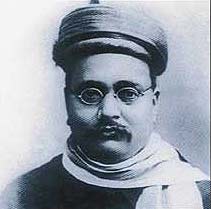Gopal Krishna Gokhale
Gopal Krishna Gokhale ( Marathi : गोपाळ कृष्ण गोखले Gopāḷ Kṛṣṇa Gokhale ; born May 9, 1866 in Kolhat , Maharashtra ; † February 19, 1915 in Poona ) was one of the most widely read Indians , a leading figure in the social and political reformers and one of the earliest founding figures of the Indian population Independence movement . Gokhale was a senior member of the Indian National Congress and the Servants of India Society . The latter was exclusively devoted to social reforms, while the Congress Party was the main engine of Indian political representation during Gokhale's time.
Education and social reform
Gokhale was a great early Indian pioneer of public education . He belonged to the first generation of Indians who had received college education, which gave Gokhale widespread respect among the emerging Indian intellectual class and throughout India, whose people saw him as the last elitist Indian. Born into a poor family, Gokhale really was a man of the people, a hero for the young Indians who discovered the new age and the possibilities of the dawning 20th century . He worked among Indians to advance education, sanitation and public development . He stood up against ignorance , the caste system and untouchability in Indian society.
He taught at Fergusson College in Pune .
Gokhale was highly regarded for his work, which he wanted to see trust and friendship between Hindus and Muslims . It should be remembered that Gokhale was a pioneer in this area as this attempt had never been made by Indians before in Indian history.
Indian National Congress
Along with other respected colleagues such as Bal Gangadhar Tilak , Dadabhai Naoroji , Bipin Chandra Pal , Lala Lajpat Rai and Annie Besant , Gokhale fought for decades for greater political representation and power in public affairs for the average Indian. He was temperate in his views and attitudes, petitioned the British authorities , cultivated a process of dialogue and discussion to bring about greater British respect for Indian rights. Gokhale had visited Ireland and arranged for an Irish nationalist, Alfred Webb , to serve as President of the Indian National Congress in 1894. In 1905 Gokhale presided over the annual meeting of the Congress Party, at which she protested against the division of Bengal , ordered by Viceroy Lord Curzon . At the 1906 Congress in Calcutta , chaired by Dadabhai Naoroji, Gokhale and Tilak were the undisputed representatives of the moderate and the aggressive nationalist wing of the Congress Party. Tilak advocated civil agitation and a direct revolution to get rid of the British Empire , which split the Congress Party into two wings in 1907. They didn't get back together until 1916.
Gokhale traveled to London several times , where he negotiated constitutional reform for India called for by the Congress Party with the liberal Secretary of State for India John Morley . However , the constitutional reform passed in 1909 by the conservative viceroy Lord Minto was more strongly determined by his state secretary Herbert Risley and Minto's own intentions to promote the Muslim League at the expense of the Congress Party. It provided separate electoral groups for Muslims and Hindus in order to take away the Muslims' fear of being dominated by the Hindus and to weaken the Congress Party. This decision anticipated the later division of British India into Pakistan and the Indian Union, since since then Muslim politicians have only been able to distinguish themselves through the dedicated representation of Muslim special interests and have not even had to seek the support of the Hindus.
Political beliefs
Gokhale did not explicitly support Indian independence because that idea would not have been understood or raised before the First World War . His most important contribution to the emergence of India was that of a teacher; Educator of a whole new generation of leaders aware of their responsibilities to a larger nation.
mentor
Gokhale was a famous mentor to the young lawyer who was deeply injured in the revolutionary work in South Africa a few years earlier. Mohandas Karamchand Gandhi experienced great human affection and closeness through Gokhale as well as personal advice, knowledge and understanding of India, the problems of the average Indian and Indian politics. Around 1920 Mohandas Karamchand Gandhi became the well-known "Mahatma" Gandhi, who became the leader of the Indian national movement and the world's largest nonviolent revolution in human history. Gokhale himself died in 1915. In his autobiography Gandhi Gokhale names his mentor and teacher, while Mohammed Ali Jinnah , the later founder of Pakistan , wanted to become a “Muslim Gokhale” in 1912 , “ambassador for the unity of Hindus and Muslims” .
Web links
credentials
- ↑ Fergusson College Department of Mathematics web page ( Memento of the original from June 19, 2006 in the Internet Archive ) Info: The archive link was automatically inserted and not yet checked. Please check the original and archive link according to the instructions and then remove this notice.
- ↑ John Hume : Speech on the award of the Gandhi Peace Prize 2001, in Seminar Magazine No. 511 March 2002, available at [1]
- ↑ Dietmar Rothermund : Jewel of the Crown - India under British colonial rule In: Die Zeit-Lexikon Welt- und Kulturgeschichte, Volume 12, Age of Nationalism, ISBN 3-411-17602-4 , pp. 347 f.
swell
- MK Gandhi: My Autobiography or The Story of My Experiments with Truth (1929).
- Stanely Wolpert: Jinnah of Pakistan . Oxford University Press, 1984, ISBN 0195034120 .
| personal data | |
|---|---|
| SURNAME | Gokhale, Gopal Krishna |
| BRIEF DESCRIPTION | Author and leader of the Indian independence movement |
| DATE OF BIRTH | May 9, 1866 |
| PLACE OF BIRTH | Kolhat , Maharashtra |
| DATE OF DEATH | February 19, 1915 |
| Place of death | Poona |
